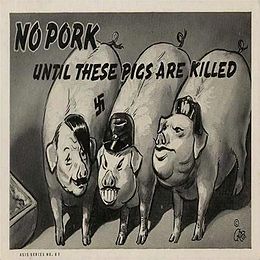 The Issue that I decided to choose was “should art be used as propaganda to aid or provoke war” as I felt that within the recent years, art and propaganda have almost been given completely separate associations and I feel that this is a direct result of the way that propaganda has been used. I will be looking at multiple elements within this debate and will provide my personal opinion as well have both primary and secondary data. Personally, I feel that propaganda should not be used as a way of assisting conflict, as I believe that it can have a huge influence on people’s opinions on a certain country or group of people. I feel that due to how subliminal these propaganda art pieces are, it can be considered a breach on a human’s free will. A topic that I have chosen is also personally significant because during my GCSE studies into history and previous wars, I got a wider understanding on what people believed caused such prolonged wars and I feel that this sparks the debate on why art is even used as a chance to taunt the enemy. Propaganda is a form of advertisement, which has a usual purpose of displaying often bias information to promote a political stance. For example, in the image above, Germany and Russia are shown to be pigs which is obviously a bias political statement, as a result of the Second World War squabbles. This propaganda poster was used in order to get the general public talking and considering the enemies as animals rather than humans.
The Issue that I decided to choose was “should art be used as propaganda to aid or provoke war” as I felt that within the recent years, art and propaganda have almost been given completely separate associations and I feel that this is a direct result of the way that propaganda has been used. I will be looking at multiple elements within this debate and will provide my personal opinion as well have both primary and secondary data. Personally, I feel that propaganda should not be used as a way of assisting conflict, as I believe that it can have a huge influence on people’s opinions on a certain country or group of people. I feel that due to how subliminal these propaganda art pieces are, it can be considered a breach on a human’s free will. A topic that I have chosen is also personally significant because during my GCSE studies into history and previous wars, I got a wider understanding on what people believed caused such prolonged wars and I feel that this sparks the debate on why art is even used as a chance to taunt the enemy. Propaganda is a form of advertisement, which has a usual purpose of displaying often bias information to promote a political stance. For example, in the image above, Germany and Russia are shown to be pigs which is obviously a bias political statement, as a result of the Second World War squabbles. This propaganda poster was used in order to get the general public talking and considering the enemies as animals rather than humans.
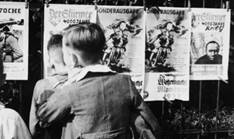 In order to answer this question I needed to first understand more about what constitutes as propaganda and how much the general public know about the debate that I am raising. I began by conducting a survey, which consisted of questions ranging from both qualitative and quantitative data. This survey was conducted online and was distributed to 25 people with ranging ages and countries. This survey was actually extremely helpful for me as it allowed me to further understand people’s prior knowledge on my debate. I made sure that in my question I included different questions, which were stemmed from the debate. Firstly, I wanted to understand what the samples views were on whether propaganda is an art or not. The way that I did this was by creating the multiple choice survey question “Do you believe propaganda is art”. What I found from the sample is that only 60 percent of the results even believe that it is an art in the first place. This left me slightly puzzled as I was unaware that so many of the samples even believed that propaganda could be considered and art and I regret not making the question qualitative so that the 40 percent that were unsure or said no, could justify why they felt this way. With that being said nearly 30 percent were left undecided instead of flat-out disagreeing with the statement. When anonymous participant justified their decision by stating that “I
In order to answer this question I needed to first understand more about what constitutes as propaganda and how much the general public know about the debate that I am raising. I began by conducting a survey, which consisted of questions ranging from both qualitative and quantitative data. This survey was conducted online and was distributed to 25 people with ranging ages and countries. This survey was actually extremely helpful for me as it allowed me to further understand people’s prior knowledge on my debate. I made sure that in my question I included different questions, which were stemmed from the debate. Firstly, I wanted to understand what the samples views were on whether propaganda is an art or not. The way that I did this was by creating the multiple choice survey question “Do you believe propaganda is art”. What I found from the sample is that only 60 percent of the results even believe that it is an art in the first place. This left me slightly puzzled as I was unaware that so many of the samples even believed that propaganda could be considered and art and I regret not making the question qualitative so that the 40 percent that were unsure or said no, could justify why they felt this way. With that being said nearly 30 percent were left undecided instead of flat-out disagreeing with the statement. When anonymous participant justified their decision by stating that “I 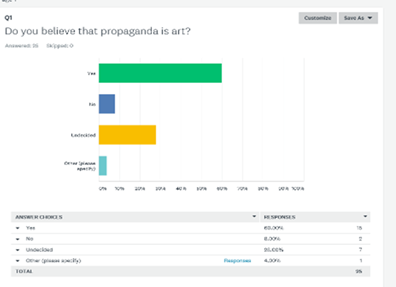 believe that the creation of any piece of media is art, however I have mixed opinions on what this specific art is for” which leads me to conclude that the majority of people consider propaganda as an art form however it does not mean that they agree with its applications. It is interesting however to see that only two of the sample participants put “no” and instead seven were undecided on the subject.
believe that the creation of any piece of media is art, however I have mixed opinions on what this specific art is for” which leads me to conclude that the majority of people consider propaganda as an art form however it does not mean that they agree with its applications. It is interesting however to see that only two of the sample participants put “no” and instead seven were undecided on the subject.
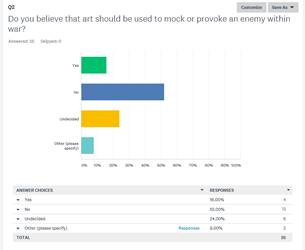
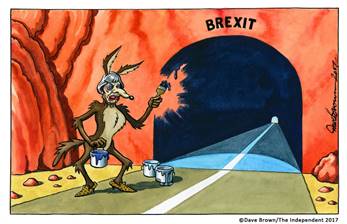 To accompany or in force the previous question I then asked the sample “Do you believe that art should be used to mock or provoke an enemy within war?” I felt that this would be one of the most important questions as it stems back to the question directly and would give me a better understanding of what people’s opinions are in propagandas application in war. The results I found actually were not as conclusive as I had expected. Prior to the survey I was adamant that most people would completely disagree with the application of art in war, however looking at the results only 52 percent answered no. 4 of the applicants completely agreed with its applications whereas 8 were undecided or unsure. When I looked at the justifications of two of the undecided participants, I actually began to understand their perspective slightly more. The first stated, “I believe in freedom of expression. I'm not sure that art plays a big part in war”. This was interesting for me as it raised another point that I was not currently thinking about which was the extent that art is even used in war. I will later touch upon this using secondary data to assist me. The second actually wrote a full-length answer, which I will take the most important parts out. “All art has its individual and personal meaning… (If) the intention would provoke a war then no I do not believe it is right in doing so”. This statement actually sheds light on both sides of the argument and it helps me to look at both sides of the debate. The idea that art is freedom of expression is completely true; however, I personally feel that as propaganda is presented most of the time as a governmental response to different situations I feel that it is no longer considered freedom of expression, but rather freedom to present ideologies to the wider public. However I do understand that if art was censored it can be considered a breach in freedom of expression and furthermore could be misconstrued as disrespect towards specific works of art.
To accompany or in force the previous question I then asked the sample “Do you believe that art should be used to mock or provoke an enemy within war?” I felt that this would be one of the most important questions as it stems back to the question directly and would give me a better understanding of what people’s opinions are in propagandas application in war. The results I found actually were not as conclusive as I had expected. Prior to the survey I was adamant that most people would completely disagree with the application of art in war, however looking at the results only 52 percent answered no. 4 of the applicants completely agreed with its applications whereas 8 were undecided or unsure. When I looked at the justifications of two of the undecided participants, I actually began to understand their perspective slightly more. The first stated, “I believe in freedom of expression. I'm not sure that art plays a big part in war”. This was interesting for me as it raised another point that I was not currently thinking about which was the extent that art is even used in war. I will later touch upon this using secondary data to assist me. The second actually wrote a full-length answer, which I will take the most important parts out. “All art has its individual and personal meaning… (If) the intention would provoke a war then no I do not believe it is right in doing so”. This statement actually sheds light on both sides of the argument and it helps me to look at both sides of the debate. The idea that art is freedom of expression is completely true; however, I personally feel that as propaganda is presented most of the time as a governmental response to different situations I feel that it is no longer considered freedom of expression, but rather freedom to present ideologies to the wider public. However I do understand that if art was censored it can be considered a breach in freedom of expression and furthermore could be misconstrued as disrespect towards specific works of art.
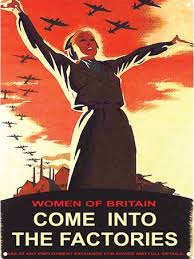
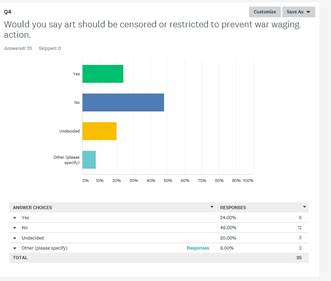 I then asked possibly one of the most important questions of the entire survey, which I felt, was going to be most important for me to enhance my ability to answer this question. “Would you say art should be censored or restricted to prevent war waging action”? This was a huge surprise for me as it turned out that over 60 percent disagreed or were unsure about this question, which is a complete contradiction to the participants answer to the previous question. What this shows is that the majority of participants believe that no restrictions or boundaries should be in place to prevent art from being used in this way despite most that believed that it is wrong to be used in war. I feel that this has also made me think further on the opinions on how the propaganda usage could be dealt with, as it seems that most are unsure if censoring is the way forward. One participant stated that it should be censored “However everyone is given their own personal will therefore may create whatever art with whatever meaning they like” which is completely true however; I feel that the idea that they can create whatever meaning they like due to free will should not be a factor in arts censorship. I believe this as censorship would not have an effect on a person’s ability to create meaning in a piece of art but rather restrict its ability to be publicized or used for unconventional purposes. However, I agree that if we censor all art that someone disagrees with then there would be no art at all. Another of the participants actually disagreed with censorship for a different reason stating that “Some propaganda can show reasons why war should be prevented or show the other side” which is true and something I had not taken into account. Not all propaganda is waging war and some have the ability to unite and provide utility to people so if I were to rewrite the question I would attempt to specify that I am only wishing to censor war waging or reinforcing art.
I then asked possibly one of the most important questions of the entire survey, which I felt, was going to be most important for me to enhance my ability to answer this question. “Would you say art should be censored or restricted to prevent war waging action”? This was a huge surprise for me as it turned out that over 60 percent disagreed or were unsure about this question, which is a complete contradiction to the participants answer to the previous question. What this shows is that the majority of participants believe that no restrictions or boundaries should be in place to prevent art from being used in this way despite most that believed that it is wrong to be used in war. I feel that this has also made me think further on the opinions on how the propaganda usage could be dealt with, as it seems that most are unsure if censoring is the way forward. One participant stated that it should be censored “However everyone is given their own personal will therefore may create whatever art with whatever meaning they like” which is completely true however; I feel that the idea that they can create whatever meaning they like due to free will should not be a factor in arts censorship. I believe this as censorship would not have an effect on a person’s ability to create meaning in a piece of art but rather restrict its ability to be publicized or used for unconventional purposes. However, I agree that if we censor all art that someone disagrees with then there would be no art at all. Another of the participants actually disagreed with censorship for a different reason stating that “Some propaganda can show reasons why war should be prevented or show the other side” which is true and something I had not taken into account. Not all propaganda is waging war and some have the ability to unite and provide utility to people so if I were to rewrite the question I would attempt to specify that I am only wishing to censor war waging or reinforcing art.
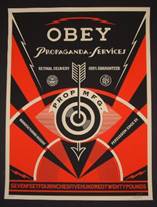
 I wanted to understand how important art actually was to people when it came to war. I didn’t want to be bias however as many things could affect someone’s opinions on arts importance so I created multiple contexts. The question I asked ended up being ‘In your opinion, how important is art in the following contexts?’ and then created a multi choice scaled answer system allowing the participants to rate the important on a scale from extremely important to extremely unimportant. When asked how important art was in war, the results were extremely varied and almost parallel to each other in results to the point where I cannot draw up an accurate conclusion for the results. With that in mind, I also collected qualitative data upon whether censoring art would affect freedom of speech. I once again got varied results but through reading through each of the answers, there was one reoccurring theme on the idea of free speech. “Yes it does because the idea of art is expressing yourself so why should you censor art and then take away the artist rights to express themselves” which I completely agree with and reading these answers have actually changed my opinions on how important freedom of speech and expression actually is. I originally had the belief that if you censor art it wouldn’t affect freedom of speech as it isn't the same as stopping people from creating art however 90 percent of the participants believed that censoring art is stopping people from making money and art which in a way is completely true. What I found even more interesting is that the participant’s ages ranged from 15 to 68 and regions from the UK to Australia and Argentina and yet had the same ideologies. This suggests that propaganda can affect people globally and furthermore shows how common propaganda is. My results that I have found can really help me in this arts issue as this can be considered as vital research into what people of today feel about propaganda
I wanted to understand how important art actually was to people when it came to war. I didn’t want to be bias however as many things could affect someone’s opinions on arts importance so I created multiple contexts. The question I asked ended up being ‘In your opinion, how important is art in the following contexts?’ and then created a multi choice scaled answer system allowing the participants to rate the important on a scale from extremely important to extremely unimportant. When asked how important art was in war, the results were extremely varied and almost parallel to each other in results to the point where I cannot draw up an accurate conclusion for the results. With that in mind, I also collected qualitative data upon whether censoring art would affect freedom of speech. I once again got varied results but through reading through each of the answers, there was one reoccurring theme on the idea of free speech. “Yes it does because the idea of art is expressing yourself so why should you censor art and then take away the artist rights to express themselves” which I completely agree with and reading these answers have actually changed my opinions on how important freedom of speech and expression actually is. I originally had the belief that if you censor art it wouldn’t affect freedom of speech as it isn't the same as stopping people from creating art however 90 percent of the participants believed that censoring art is stopping people from making money and art which in a way is completely true. What I found even more interesting is that the participant’s ages ranged from 15 to 68 and regions from the UK to Australia and Argentina and yet had the same ideologies. This suggests that propaganda can affect people globally and furthermore shows how common propaganda is. My results that I have found can really help me in this arts issue as this can be considered as vital research into what people of today feel about propaganda
Before learning about my participants opinions on this topic I wanted to learn more about what propaganda was and obtain more factual information. I began by looking at the source I have labelled ‘source 1’ which was the use of propaganda in the media by Johnnie Manzaria and Jonathon Bruck. This source really put into perspective the shear threat that propaganda can cause, even going as far as to say that we need to “defend” ourselves from it. The reason I chose this source is because it actually contained a case study reference by ‘Phil Zimbardo’ who is a renowned Phycologist of people’s behaviour and “mind control or manipulation” techniques. In this case study I now understand that media can have the ability to exploit multiple persuasive tactics and it can be used to provoke or rumour about specific topic, event or person. I can use this to support my  side of the debate because it is clear from my research that propaganda can have damaging effects such as entire countries turning on each other such as that of both world wars and as(Zimbardo 47) states, “one must be willing to disobey, to defy, to challenge, and to suffer any ensuing consequences” which shows that clearly creating propaganda itself is quite a risky process as guidelines must be followed. However the source also states that it doesn’t advocate the propaganda is wrong. It actually is only trying to show that overall it is useful to know how propaganda tries to influence people. This is a valid argument and furthermore is a compromise to the idea that propaganda should be removed completely. It shows that as an alternate, you could instead educate people on how to know what propaganda is trying to tell you. This actually has altered my opinion slightly as I had only been looking at the argument from one angle and that the only solution to the threats that propaganda faces is to censor it or remove it all together when in reality there are other ways to control the effects of propaganda.
side of the debate because it is clear from my research that propaganda can have damaging effects such as entire countries turning on each other such as that of both world wars and as(Zimbardo 47) states, “one must be willing to disobey, to defy, to challenge, and to suffer any ensuing consequences” which shows that clearly creating propaganda itself is quite a risky process as guidelines must be followed. However the source also states that it doesn’t advocate the propaganda is wrong. It actually is only trying to show that overall it is useful to know how propaganda tries to influence people. This is a valid argument and furthermore is a compromise to the idea that propaganda should be removed completely. It shows that as an alternate, you could instead educate people on how to know what propaganda is trying to tell you. This actually has altered my opinion slightly as I had only been looking at the argument from one angle and that the only solution to the threats that propaganda faces is to censor it or remove it all together when in reality there are other ways to control the effects of propaganda.
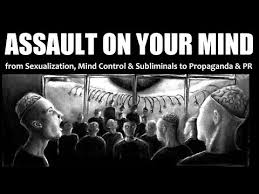 Source four further argued against my statement by asking the question “should propaganda support war? "The source states that propaganda had really vital applications within the first World War. It argues that the artful propaganda was used in order to get the general public to put money towards buying war bonds. This was vital for the soldiers on the front lines as rations were becoming extremely low. Without propaganda the soldiers would have died of starvation. This is such a valid argument because propaganda in history has had some extremely important applications of support for soldiers and just the war in general. It is always seen as a negative as propaganda has a negative connotation which has been built up over time. It states that there are moral and immoral forms of propaganda and often the line is misguided. This has further altered my opinions I feel that the useful applications are starting to outweigh the social complications. The source however also sheds light to the fact that propaganda forces people to die for lies. A separate voice to the source believes that propagandas purpose is to attempt to shape the general public’s minds through manipulation. For this reason it would make sense to argue it to be banned completely as people should have the right to make their own decisions, without being manipulated by artistic propaganda. Most propaganda shows slanderous imagery of the enemy of the publisher. This style of artwork is a way of sharing an artist’s ideology with the wider public while subliminally making viewers feel that this should be peoples own opinions. I agree that this is an issue as it is obvious that just because you leave in a certain geographical area, doesn’t mean you have to be roped into risking your life through recruitment posters or giving away currency for bonds. This actually brings backing to my argument in a whole different way, showing a different reason as to why the propaganda should be banned. I believed that it was a matter of provoking wars with other countries as a global scale, but I hadn’t taken into account the little changes made to people’s lives as a result of the propaganda. Art should always make you think as arguably that is an important factor within art work, and for that reason possibly propaganda follows that same perspective in many ways which counters my argument.
Source four further argued against my statement by asking the question “should propaganda support war? "The source states that propaganda had really vital applications within the first World War. It argues that the artful propaganda was used in order to get the general public to put money towards buying war bonds. This was vital for the soldiers on the front lines as rations were becoming extremely low. Without propaganda the soldiers would have died of starvation. This is such a valid argument because propaganda in history has had some extremely important applications of support for soldiers and just the war in general. It is always seen as a negative as propaganda has a negative connotation which has been built up over time. It states that there are moral and immoral forms of propaganda and often the line is misguided. This has further altered my opinions I feel that the useful applications are starting to outweigh the social complications. The source however also sheds light to the fact that propaganda forces people to die for lies. A separate voice to the source believes that propagandas purpose is to attempt to shape the general public’s minds through manipulation. For this reason it would make sense to argue it to be banned completely as people should have the right to make their own decisions, without being manipulated by artistic propaganda. Most propaganda shows slanderous imagery of the enemy of the publisher. This style of artwork is a way of sharing an artist’s ideology with the wider public while subliminally making viewers feel that this should be peoples own opinions. I agree that this is an issue as it is obvious that just because you leave in a certain geographical area, doesn’t mean you have to be roped into risking your life through recruitment posters or giving away currency for bonds. This actually brings backing to my argument in a whole different way, showing a different reason as to why the propaganda should be banned. I believed that it was a matter of provoking wars with other countries as a global scale, but I hadn’t taken into account the little changes made to people’s lives as a result of the propaganda. Art should always make you think as arguably that is an important factor within art work, and for that reason possibly propaganda follows that same perspective in many ways which counters my argument.
In conclusion I really feel that throughout the course of my research I have been opened up to the many perspectives within this rather complex argument. I have found that the majority of the general public believe that using propaganda within conflict as a tool of provoking of supporting nature is wrong, however do not feel that it should be censored or removed. It is almost considered to be a “necessary evil” possibly due to the counter arguments which show artistic propaganda to be a necessity in aiding troops in different wars as some types of propaganda is not war provoking. I personally feel that my opinion on the argument has actually shifted more on the side of keeping propaganda as it seems that the pros outweigh the cons. I feel this is partly due to the fact that there is very little statistical evidence of propaganda being a causation of a war. I do however feel that propagandas effects should be made known to the public as a precaution for those wishing to keep their mind un-influenced. I was actually surprised at how only 60 percent of individuals who answered the survey even considered propaganda to be art.
Reference Images Bibliography
[1] https://www.unwelcomeguests.net/Category:War_Propaganda
[2] https://encyclopedia.ushmm.org/content/en/article/nazi-propaganda
[3] – Question 1 screenshot from my survey monkey
[4] – Question 2 screenshot from my survey monkey
[6] – Question 4 screenshot from survey monkey
[7] – https://www.popartuk.com/art/propaganda/women-of-britain-come-into-the-factories-60006-tin-sign.asp
[8] Question 5 screenshot from survey monkey



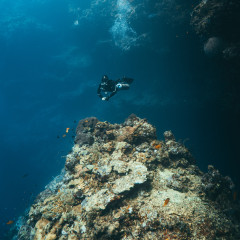
This really is a topic I know very little about. You have done some very interesting research into the subject. I think that art is often used to provoke debate and to influence peoples opinions on a topic and propaganda is no exception. I think that some people may be more influenced by the messages within and it is unfortunate that art is used in war to negatively influence and give false information. However, I believe that everyone should have the right to express their opinions through art, although I may not agree with that opinion. When art is used to attack a race or group of individuals, it should be dealt with in the same way as any other act of discrimination. An informative piece that I have learnt a lot from. well done.